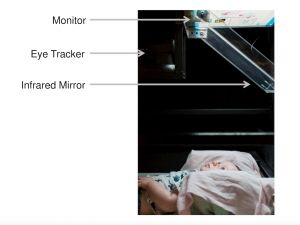According to new research published in Developmental Science and carried out at Canada’s York University, babies who hear two languages at home develop advantages in attention.
In the study, infants who were exposed to more than one language showed better attentional control than infants who were exposed to only one language. This means that exposure to bilingual environments should be considered a significant factor in the early development of attention in infancy, the researchers say, and could set the stage for lifelong cognitive benefits.
The research was conducted by famed specialist in the study of bilingualism Ellen Bialystok, distinguished research professor of psychology and Walter Gordon research chair of Lifespan Cognitive Development, and Scott Adler, associate professor in York’s Department of Psychology and the Centre for Vision Research, along with lead author Kyle J. Comishen.
The researchers conducted two separate studies in which infants’ eye movements were measured to assess attention and learning. Half of the infants who were studied were being raised in monolingual environments while others were being raised in environments in which they heard two languages spoken approximately half of the time each. The infants were shown images as they lay in a crib equipped with a camera and screen, and their eye movements were tracked and recorded as they watched pictures appear above them, in different areas of the screen. The tracking was conducted 60 times for each infant.

“By studying infants—a population that does not yet speak any language—we discovered that the real difference between monolingual and bilingual individuals later in life is not in the language itself, but rather, in the attention system used to focus on language,” claims Bialystok. “This study tells us that from the very earliest stage of development, the networks that are the basis for developing attention are forming differently in infants who are being raised in a bilingual environment. Why is that important? It’s because attention is the basis for all cognition.”
In the first study, the infants saw one of two images in the center of the screen followed by another image appearing on either the left or right side of the screen. The babies learned to expect that if, for example, a pink and white image appears in the center of the screen, it would be followed by an attractive target image on the left; If a blue and yellow image appeared in the center, then the target would appear on the right. All the infants could learn these rules.
In the second study, which began in the same way, researchers switched the rule halfway through the experiment. When they tracked the babies’ eye movements, they found that infants who were exposed to a bilingual environment were better at learning the new rule and at anticipating where the target image would appear. This is difficult because they needed to learn a new association and replace a successful response with a new contrasting one.
“Infants only know which way to look if they can discriminate between the two pictures that appear in the center,” said Adler. “They will eventually anticipate the picture appearing on the right, for example, by making an eye movement even before that picture appears on the right. What we found was that the infants who were raised in bilingual environments were able to do this better after the rule is switched than those raised in a monolingual environment.”
Anything that comes through the brain’s processing system interacts with this attentional mechanism, says Adler. Therefore, language, as well as visual information, can influence the development of the attentional system.
Researchers say the experience of attending to a complex environment in which infants simultaneously process and contrast two languages may account for why infants raised in bilingual environments have greater attentional control than those raised in monolingual environments.
In previous research, bilingual children and adults outperformed monolinguals on some cognitive tasks that require them to switch responses or deal with conflict. The reason for those differences were thought to follow from the ongoing need for bilinguals to select which language to speak. This new study pushes back the explanation to a time before individuals are actively using languages and switching between them.
“What is so ground-breaking about these results, is that they look at infants who are not bilingual yet and who are only hearing the bilingual environment. This is what’s having the impact on cognitive performance,” remarked Adler.
York University’s fully bilingual Glendon Campus is home to Southern Ontario’s Centre of Excellence for French Language and Bilingual Postsecondary Education.







